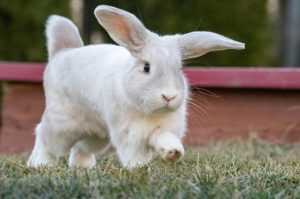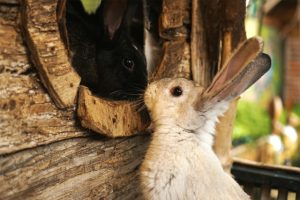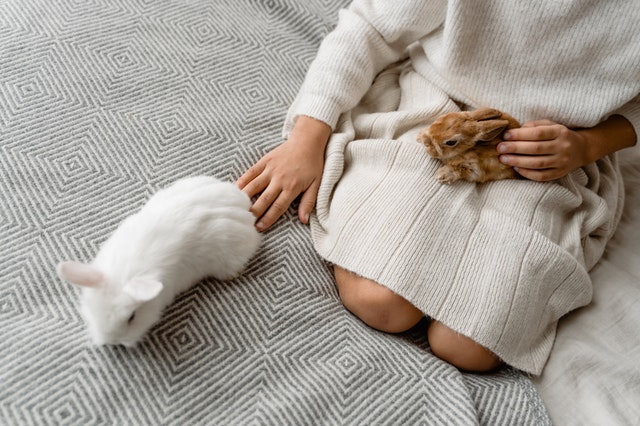
Rabbits are considered to be induced ovulators. This means that they ovulate when they are mating. Animals in general go through cycles, what we call ‘in heat’, the rabbit does not. They will only ovulate while they are mating which can almost certainly guarantee pregnancy.
Many rabbit owners are not aware that a pregnant rabbit is much different than many other animals. A rabbit who is pregnant will experience the gestational term and the labor and delivery in ways that are substantially more difficult. For instance, sexual maturity happens much sooner in a rabbit, than other animals. A female rabbit, (doe) can become pregnant at just three and one half months old. This is when they become sexually mature.
For the next 30 days, you will be able to tell that your doe is pregnant. She will gain weight, she may seem cranky and want to be left alone. Her abdomen will increase in size, just as all mammals do. About 10 to 12 days into the pregnancy, you will be able to feel the babies inside her abdomen. They will feel like marble sized lumps.
Just as most other mammals do, your rabbit will experience what is called ‘nesting’ in the last week of her pregnancy. Nesting means that she is preparing for the birth. She will begin to pull her fur out in the effort of lining the nest area, or bed. She may be seemingly digging in the corner to make a nest for her young. Adding some extra hay or even a small blanket, so that she can push this and make it into a nest.
This nesting period is a sign that your rabbit will be giving birth in likely a week or slightly more. There are times that rabbits will experience issues during the pregnancy that are not normal. All of these issues are not healthy for your rabbit. If any of the following occur, please take your rabbit in to see the vet. The vet can determine if there is an issue or if this is a normal pregnancy. The vet will give the rabbit any needed assistance and be watchful of what happens.
The most common pregnancy issues
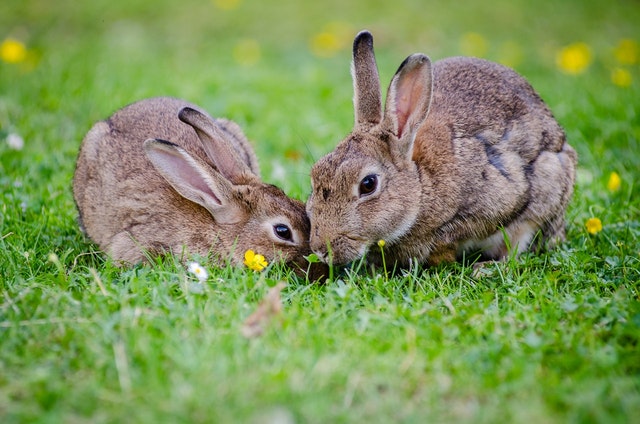
False Pregnancy
This is similar to hysterical pregnancy. It can happen when the rabbit has mated and she believes she is pregnant, but in reality is not. She will experience the extra eating, the moodiness and she may be cranky. All the signs will seem apparent that you can expect babies soon. She will even begin the nesting period. This false pregnancy will last roughly 2 to 3 weeks.
Toxemia
This is a condition that occurs when the female is not obtaining the necessary nutritional diet she needs at this time. Toxemia, or Ketosis, will happen due to lack of nutrition. Feeding your rabbit extra good quality hay, and the staples needed for rabbits will help during this time. Ketosis will cause the mother to mobilize extra areas of fat to compensate for the nutrition shortage.
This causes ketone build up in her blood. Some of the signs of Ketosis or Toxemia are lethargy, weakness, anorexia or eating very very little, and it will be apparent that she is struggling to breathe, as though she is not getting enough air. These situations can lead to seizures and possible death. She may also spontaneously abort the young.
Dystocia
Like other mammals, your domesticated rabbit may have difficulty giving birth or be unable to give birth on her own. When a rabbit is unable to expel the fetus(es), this is called dystocia. There is likely an issue with the maternal organs or the baby rabbit is not in the correct position, could be too large or has passed on over the rainbow bridge and is unable to make its way out.
The most common factor for dystocia is uterine inertia on the mothers part. Primary uterine inertia is considered to be gestation beyond the expected time frame, and the inability to progress to the stage two portion of labor and delivery.
What is scary about this is that a rabbit gives birth at night. There may not be anyone around at the time to see her struggling. Which means that a vet would not be contacted as needed, or too late.
One thing that we must emphasize is that pregnancy problems in rabbits are rare. It can be easy to think that your rabbit is going through dystocia during labor. The actual birth is generally very quick when it is time, she will be able to expel the litter quickly, and there is no delayed delivery as we see with dogs and cats, where there could be hours in between the deliveries.
Your vet will be able to determine if dystocia is occurring. He or she will then attempt to assist in the birthing process by manually extracting the fetuses and the associated membranes. This is done by the vet only. A lay person does not fully understand the medical issues that can occur to rabbits. Be sure to have a vet that has training in the treatment and care of rabbits.
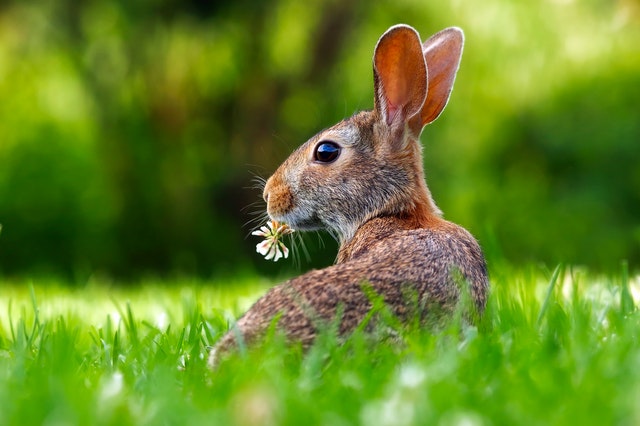
Mastitis
Mastitis is an infection of the mammary glands. Therefore it will not affect the males. This affects the mothers who are nursing. It could rapidly advance to a blood infection which would likely cause the death of the doe.
Prenatal Mortality
So let’s say you know the rabbit is pregnant, you go to the cage and suddenly all signs of pregnancy seem amiss. Sometimes, a fetus will pass while in the uterus and be reabsorbed into the mother. This would happen before the 3 week mark in gestation. If it occurs at any point past the 3 week mark it would be considered a spontaneous abortion.
Male Infertility
Let’s be fair though. It is not just the female rabbits that may have issues. Although it is obvious that male rabbits (bucks) cannot become pregnant, they too could have issues when it comes to pregnancy, or lack thereof. It has been seen, through scientific study, that overweight males have a decreased sperm count.
It points out that even with a low sperm count, these males may still produce a pregnancy if females. It is not guaranteed however. Further studies show that the males who were able to impregnate the females, showed no difference in the number of offspring.
What this study showed us was that in male rabbits who had a high fat content in their diet, had a lower sperm concentration which leads to less pregnancy, but not lower numbers of offspring. The sperm binding ability is affected by the fat content in the diet.
Reproductive Diseases and Disorders
Medical conditions such as metabolic disorders and also bacterial infections could likely have an effect on pregnancy in rabbits. Pasteurella Bacteria is found in both the male and the females. However, the females are most often affected. If both the uterus horns are affected in the female, pregnancy is unlikely to occur.
If only one horn is affected, a litter can successfully grow in the other horn. The only obvious sign in a doe is a yellowish-gray and thick discharge from the vagina. In a buck, there could be one enlarged testicle or a pus draining from the urethra.
Long term infection is likely in both the male and the female. The bacteria is transferred during the mating process. Treatment for this infection may not eliminate it completely. This treatment is done by the vet, for the rabbit. The rabbit owner will need to thoroughly and completely clean the rabbit hutch, or provide a new hutch.
Treponematosis
Known as Rabbit Syphilis, is a venereal disease caused by the treponema bacteria. This bacteria can be found in both the buck and the does. This bacteria is passed on through the mating process. The doe will also pass it on to the offspring she has. Since it is passed during the mating process or birthing, this bacteria is not transferable to other animals or to humans. The signs will be sores and blisters, even the rabbit's eyes can become infected.
Your pet’s vet will give treatment via a dose of Penicillin G. If you have more than one or two rabbits, you will need to have all of them treated. Due to the side effects from the treatment, your rabbit will need to be treated with anti diarrhea medicine and also have their food changed to a good quality hay.
As you can see, proper and routine medical care is extremely important for your rabbits. It may seem like they can deal with all the issues on their own, but they are no more capable of that than a human is. Proper treatment must be done by the Vet in order to ensure a healthy pair of rabbits and their healthy offspring.
Rabbit pregnancy is not a time when you can make an appointment for a month out. This could be too late, when exams are done routinely, your pet will remain happy and healthy and be able to mate and have offspring.



